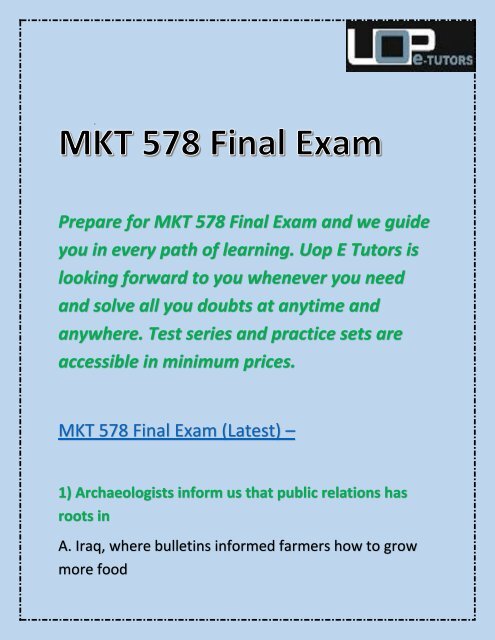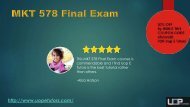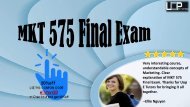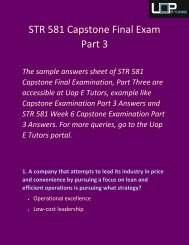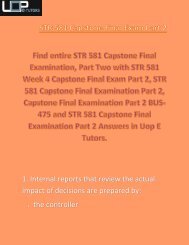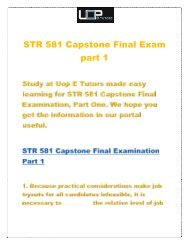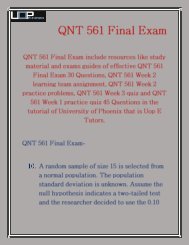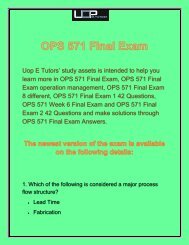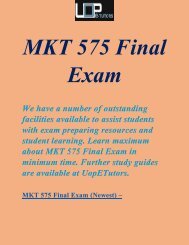MKT 578 Week 3 & 4 | MKT 578 Final Exam | Uop E Tutors
To learn MKT 578 Final Exam, UopETutors has great resources to help you make the grade. MKT 578 Final Exam practice sets can help you to determine where you are in the preparation of MKT 578 Final Exam. http://www.uopetutors.com/University-of-phoenix/MKT-578-Final-Exam.html
To learn MKT 578 Final Exam, UopETutors has great resources to help you make the grade. MKT 578 Final Exam practice sets can help you to determine where you are in the preparation of MKT 578 Final Exam.
http://www.uopetutors.com/University-of-phoenix/MKT-578-Final-Exam.html
You also want an ePaper? Increase the reach of your titles
YUMPU automatically turns print PDFs into web optimized ePapers that Google loves.
Prepare for <strong>MKT</strong> <strong>578</strong> <strong>Final</strong> <strong>Exam</strong> and we guide<br />
you in every path of learning. <strong>Uop</strong> E <strong>Tutors</strong> is<br />
looking forward to you whenever you need<br />
and solve all you doubts at anytime and<br />
anywhere. Test series and practice sets are<br />
accessible in minimum prices.<br />
<strong>MKT</strong> <strong>578</strong> <strong>Final</strong> <strong>Exam</strong> (Latest) –<br />
1) Archaeologists inform us that public relations has<br />
roots in<br />
A. Iraq, where bulletins informed farmers how to grow<br />
more food
B. England, where 18th century bulletins hailed the<br />
coming of the British Industrial Revolution<br />
C. Rome, where tablets paid tribute to new rulers<br />
D. China, where during the Ming Dynasty peasants wrote<br />
messages on the Great Wall<br />
2) The word propaganda originated with<br />
A. the Creel Committee during World War II<br />
B. Pope Gregory XV, who established a College in 17th<br />
Century Rome to spread the word about Catholicism<br />
C. Sophists, who walked around telling citizens of Rome<br />
who to vote for.<br />
D. the farmers who grew grapes in ancient Italy<br />
3) Applying the widely repeated definition of public<br />
relations developed by the late Denny Griswold to serve<br />
an organization properly, practitioners ought to serve as<br />
A. counsels to chief legal officers<br />
B. honest brokers to management
C. advisers to human resources directors<br />
D. consultants to directors of marketing<br />
4) To effectively communicate with a public, it is<br />
important to recognize that<br />
A. all publics have the same needs<br />
B. all publics are most interested in the technology you<br />
use<br />
C. all publics have their own special needs and require<br />
different types of communication<br />
D. all publics have overlapping organizational needs<br />
5) One major reason to do an in-depth interview of top<br />
management and communicators before designing an<br />
effective employee communications program is to<br />
A. minimize the discontinuities between what each group<br />
thinks the other wants.<br />
B. ignore what communicators think management wants<br />
from them
C. ignore what management thinks it wants from<br />
communicators<br />
D. to minimize groupthink<br />
6) As arbiters of communications in organizations, it’s<br />
been the charge of public relations people since the<br />
1960s to<br />
A. deal in an enlightened manner with the realities of a<br />
multicultural society<br />
B. sensitize the rest of the world to multicultural needs of<br />
Americans<br />
C. make an impact on renewing the energies of various<br />
ethnic communities<br />
D. enhance the power of the disenfranchised<br />
7) How does advice to clients from lawyers differ from<br />
advice given to clients by public relations practitioners?
A. Lawyers advise clients what they should do, within the<br />
letter of legal requirements, to defend themselves in the<br />
court of public opinion.<br />
B. Public relations practitioners advise clients what they<br />
must do to defend themselves in a court of law.<br />
C. Lawyers advise clients what they should do to act<br />
ethically and socially responsible.<br />
D. Public relations practitioners advise clients what they<br />
should do to defend themselves in the court of public<br />
opinion.<br />
8) Litigation public relations can best be defined as<br />
A. attempting to influence a potential jury prior to the<br />
beginning of a case<br />
B. attempting to gain buy-in from the legal teams<br />
associated with the case<br />
C. attempting to settle the case out of court
D. attempting to manage the media process during the<br />
course of a legal dispute so as to affect the outcome or<br />
its impact on the client’s reputation<br />
9) An organization’s social responsibility image is often<br />
determined by<br />
A. its desire to earn a profit above all else<br />
B. its focus on being the number one patron of the arts<br />
C. its attention to be ethical and to improve the quality of<br />
life for people<br />
D. its focus on looking good rather than doing the right<br />
thing<br />
10) The success of public relations in the 21st century is<br />
likely to depend heavily on<br />
A. following the Code of Ethics published by the Society<br />
of Professional Journalists<br />
B. following regulatory standards set forth by the Federal<br />
Communications Commission
C. how the field responds to the issue of ethical conduct<br />
and preserves its credibility<br />
D. remaining vigilant regarding a person’s right to privacy<br />
http://www.uopetutors.com/University-ofphoenix/<strong>MKT</strong>-<strong>578</strong>-<strong>Final</strong>-<strong>Exam</strong>-Latest.html<br />
Prepare yourself in every subject by<br />
learning from <strong>Uop</strong>E<strong>Tutors</strong> courses such<br />
as


